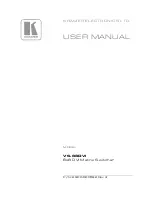
IP Address Configuration
271
address. If there is no subnet division, then its subnet mask is the default value and
the length of "1" indicates the net-id length. Therefore, for IP addresses of classes A,
B and C, the default values of corresponding subnet mask are 255.0.0.0, 255.255.0.0
and 255.255.255.0 respectively.
The mask can be used to divide a Class A network containing more than 16,000,000
hosts or a Class B network containing more than 60,000 hosts into multiple small
networks. Each small network is called a subnet. For example, for the Class B network
address 138.38.0.0, the mask 255.255.224.0 can be used to divide the network into
8 subnets: 138.38.0.0, 202.38.32.0, 138.38.64.0, 138.38.96.0, 138.38.128.0,
138.38.160.0, 138.38.192.0 and 138.38.224.0 (Refer to the Figure 62). Each subnet
can contain more than 8000 hosts.
Figure 62
Subnet Division of IP Address
Configuring IP Address
Configure an IP address for a VLAN interface in one of three ways:
■
Using the IP address configuration command
■
Allocated by BOOTP server
■
Allocated by DHCP server
These three methods are mutually exclusive and a new configuration will replace the
current IP address. For example, if you apply for an IP address using the
ip address
bootp-alloc
command, the address allocated by BOOTP shall replace the
currently-configured IP address.
This section introduces how to configure an IP address with the IP address
configuration command. The other two methods are described in subsequent
chapters.
The IP address configuration is described in the following sections:
■
Configuring the Hostname and Host IP Address
■
Configuring the IP Address of the VLAN Interface
Configuring the Hostname and Host IP Address
The host name is corresponded to the IP address by using this command. When you
use applications like Telnet, you can use the host name without having to memorize
the IP address since the system translates it to the IP address automatically.
10001010, 00100110, 000 00000, 00000000
ClassB
138.38.0.0
Subnet mask
255.255.224.0
11111111, 11111111, 111 00000, 00000000
11111111, 11111111, 000 00000, 00000000
Standard
mask
255.255.0.0
Subnet address:
000
Subnet address: 138.38. 0. 0
001
Subnet address: 138.38. 32. 0
010
Subnet address: 138.38. 64. 0
011
Subnet address: 138.38. 96. 0
100
Subnet address: 138.38.128. 0
101
Subnet address: 138.38.160. 0
110
Subnet address: 138.38.192. 0
111
Subnet address: 138.38.224. 0
Subnet
number
Host
number
Subnet address:
10001010, 00100110, 000 00000, 00000000
ClassB
138.38.0.0
Subnet mask
255.255.224.0
11111111, 11111111, 111 00000, 00000000
11111111, 11111111, 000 00000, 00000000
Standard
mask
255.255.0.0
Subnet address:
000
Subnet address: 138.38. 0. 0
001
Subnet address: 138.38. 32. 0
010
Subnet address: 138.38. 64. 0
011
Subnet address: 138.38. 96. 0
100
Subnet address: 138.38.128. 0
101
Subnet address: 138.38.160. 0
110
Subnet address: 138.38.192. 0
111
Subnet address: 138.38.224. 0
Subnet
number
Host
number
Subnet address:
Summary of Contents for 5500 SI - Switch - Stackable
Page 24: ...24 ABOUT THIS GUIDE...
Page 50: ...50 CHAPTER 1 GETTING STARTED...
Page 54: ...54 CHAPTER 2 ADDRESS MANAGEMENT CONFIGURATION...
Page 78: ...78 CHAPTER 3 PORT OPERATION...
Page 88: ...88 CHAPTER 4 XRN CONFIGURATION...
Page 122: ...122 CHAPTER 8 VLAN VPN CONFIGURATION...
Page 216: ...216 CHAPTER 15 SSH TERMINAL SERVICES...
Page 268: ...268 CHAPTER 16 IP ROUTING PROTOCOL OPERATION...
Page 308: ...308 CHAPTER 17 NETWORK PROTOCOL OPERATION...
Page 349: ...349...
Page 350: ...350 CHAPTER 18 MULTICAST PROTOCOL...
Page 522: ...522 CHAPTER 22 FILE SYSTEM MANAGEMENT...
Page 584: ...584 CHAPTER 30 PASSWORD CONTROL CONFIGURATION OPERATIONS...
Page 600: ...600 CHAPTER 31 MSDP CONFIGURATION...
Page 614: ...614 CHAPTER 32 CLUSTERING...
Page 670: ...670 CHAPTER C AUTHENTICATING THE SWITCH 5500 WITH CISCO SECURE ACS...
















































